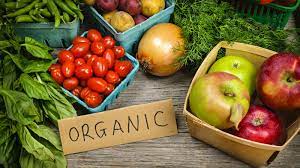The Benefits of Organic Products
Organic products have gained popularity in recent years as more people become aware of the benefits they offer. From food to skincare and clothing, choosing organic options can have a positive impact on both your health and the environment.
Health Benefits
One of the main reasons people opt for organic products is their potential health benefits. Organic foods are grown without synthetic pesticides, fertilizers, or genetically modified organisms (GMOs), making them a healthier choice for consumers. Studies have shown that organic produce may contain higher levels of antioxidants and essential nutrients compared to conventionally grown foods.
In addition to food, organic skincare products are becoming increasingly popular due to their natural ingredients and lack of harsh chemicals. These products are less likely to cause skin irritation or allergic reactions, making them a safer choice for those with sensitive skin.
Environmental Impact
Choosing organic products also has a positive impact on the environment. Organic farming practices focus on sustainability and biodiversity, promoting soil health and reducing water pollution. By avoiding synthetic chemicals, organic farmers help protect wildlife and preserve natural ecosystems.
Furthermore, organic clothing made from natural fibers such as cotton or hemp is biodegradable and requires fewer resources to produce compared to conventional textiles. This reduces the carbon footprint associated with clothing manufacturing and contributes to a more sustainable fashion industry.
Ethical Considerations
Many consumers choose organic products not only for their health and environmental benefits but also for ethical reasons. Organic farming practices prioritize animal welfare, fair labor practices, and community well-being. By supporting organic producers, consumers can contribute to a more ethical supply chain that values sustainability and social responsibility.
Conclusion
Whether you’re looking to improve your health, reduce your environmental impact, or support ethical practices, choosing organic products is a step in the right direction. By making conscious decisions about the products we consume and use in our daily lives, we can create a healthier and more sustainable world for future generations.
Understanding Organic: Answers to Common Questions About Organic Standards and Definitions
- Does organic mean 100% natural?
- What does organic mean?
- What is the real meaning of organic?
- What does it mean when a person is organic?
- What defines organic food?
Does organic mean 100% natural?
The frequently asked question, “Does organic mean 100% natural?” often arises when consumers are seeking clarity on the distinction between organic and natural products. While organic products are grown or produced without synthetic chemicals, pesticides, or genetically modified organisms (GMOs), they may not always be 100% natural. Organic certification standards focus on sustainable farming practices and the absence of certain harmful substances, but some processing methods may still be used in organic products. Therefore, while organic products prioritize natural ingredients and environmentally friendly practices, they may not always guarantee that every component is completely untouched by processing methods.
What does organic mean?
Organic refers to a method of farming and production that avoids the use of synthetic pesticides, fertilizers, genetically modified organisms (GMOs), and other artificial additives. Organic practices prioritize sustainability, soil health, biodiversity, and animal welfare. When a product is labeled as organic, it means that it has been produced following strict standards set by organic certification bodies. Choosing organic products can offer benefits such as higher nutrient content, reduced exposure to harmful chemicals, and support for environmentally friendly practices.
What is the real meaning of organic?
The real meaning of organic refers to products that are produced using natural methods without the use of synthetic chemicals, pesticides, or genetically modified organisms (GMOs). In the context of food, organic farming practices prioritize soil health, biodiversity, and sustainability. Organic products are grown and processed in ways that promote environmental conservation and animal welfare. Choosing organic options can have benefits for both personal health and the planet, making it a popular choice for those seeking a more natural and sustainable lifestyle.
What does it mean when a person is organic?
When a person is described as “organic,” it typically refers to their lifestyle choices and preferences that prioritize natural and sustainable practices. Being organic can encompass various aspects of one’s life, such as consuming organic food, using organic skincare products, wearing organic clothing, or supporting eco-friendly and ethical initiatives. Essentially, being organic reflects a commitment to promoting health, environmental sustainability, and ethical values in daily living.
What defines organic food?
Organic food is defined by a set of agricultural practices that prioritize natural and sustainable methods of farming. To be considered organic, food must be grown without the use of synthetic pesticides, fertilizers, or genetically modified organisms (GMOs). Organic farming also emphasizes soil health, biodiversity, and animal welfare. Additionally, organic food production prohibits the use of artificial additives, preservatives, and irradiation. By adhering to these standards, organic food aims to provide consumers with products that are healthier for both people and the environment.





